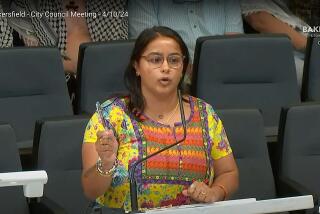On the Run, but Not Out of Reach
It’s 5:15 a.m., but on Castor Street, it might as well be the dead of night. The sound of soft rain and wind rustling through a willow tree is broken only by the breathing of six immigration agents standing in the dark.
They have quietly slipped through an open iron gate at a ranch-style house in Santa Ana. And suddenly:
“Police! Open the door!” shouts one.
Again, this time in Spanish: “¡Policia! Abre la puerta, por favor!”
Their quarry is 42-year-old Abel Hernan Alvarez Monarez -- and it’s he who opens the door, shirtless, in a pair of shorts. After a short exchange of words, he grabs a shirt and a pair of pants and leaves, as distraught family members watch in silence.
Alvarez entered the United States illegally 17 years ago and was ordered deported six years ago. Finally, on this dreary morning he is being escorted out of the country.
The tactics leading to his capture last month counter the images of officers raiding sweatshops or swarming street corners, scattering workers who warn others, “La migra!”
In increasing numbers, agents for the U.S. Immigration Customs Enforcement office of the U.S. Department of Homeland Security are quietly arresting undocumented immigrants, one at a time, on a daily basis. For the 12 months ending Sept. 30, agents in the Los Angeles area -- which includes Los Angeles, Orange, San Bernardino and Riverside counties -- deported 2,341 illegal immigrants one by one -- people like Alvarez Monarez whose names and whereabouts were known to them.
The strategy of tracking down individual illegal immigrants has its critics, who say it will not stop or even deter illegal immigration.
“Going after these people is a never-ending treadmill,” said Greg Simons, spokesman for the Coalition for Humane Immigrant Rights of Los Angeles. “It would take years to find them.”
Immigration officials, fortified with enriched budgets in a post-9/11 era of heightened concerns about immigrants, say they are finally addressing a long-ignored problem: undocumented immigrants who ignore court orders to leave the country.
“In the past, [we] were criticized for failing to connect the dots,” said ICE spokeswoman Virginia Kice. “What we want to show is that people should take these orders seriously. We are out there looking for you.”
Primary among the agents’ targets are people who have been ordered deported by immigration judges but who are allowed to remain in the country pending appeal. The final decision comes in the mail from the Executive Office for Immigration Review in the Department of Justice. The letters are known euphemistically as “run letters” because the recipients frequently flee after receiving word that their deportation appeals were denied.
Federal officials estimate that as many as 90% of those who receive deportation orders ignore them. There are about 35,000 such absconders in Southern California and nearly 400,000 nationwide, the government estimates.
The Los Angeles-based enforcement team arrested more violators than any other ICE team in the country over the last year -- in part because of the large number of local offenders.
About 100 ICE agents are deployed nationwide in the search for absconders. More agents are expected to be hired next year to beef up the $50-million enforcement program, said Victor Cerda, ICE acting director for detention and removal operations.
Immigration advocates say the operations target workers with families who will likely return illegally, even though they face prison time for illegal reentry.
About 83% of the absconders arrested by ICE agents in the Los Angeles area are known criminals. Others appear on the government’s radar screen simply by having innocently gone to immigration offices to seek asylum or legal residency but having qualified for neither.
Ira Mehlman, spokesman for the Federation for American Immigration Reform, says the government is going after “low-hanging fruit,” while millions of illegal immigrants know their chances of dodging authorities “are pretty good.”
Immigration officials concede that many of the deported illegal immigrants will return.
“We just tell the wives, ‘Listen, lady, call your husband’s job and tell them he’ll be sick for the next couple of days,’ ” said Jorge Field, who supervises ICE deportation officers.
Immigrants illegally reentering the United States remain a “continuing challenge,” Cerda said, but more border patrols, stiffer penalties for reentry and more overall enforcement could reduce the occurrence.
Government officials, citing confidentiality laws, would not discuss how they came to know Alvarez Monarez, who they said had no other criminal record aside from his illegal residency. He declined to be interviewed.
What is publicly known is that Alvarez Monarez appealed the decision and when the deportation letter came, he ignored it. By 7 a.m. on the day he was taken into custody, the fugitive operations team had two other men in custody.
The drill is the same: The deportees are photographed and fingerprinted, and if they are from Mexico, they are sent south of the border the same day.
For some who are caught up in the ICE dragnet, their arrest brings an abrupt end to years of living in the United States.
Umberto Vargas, 24, experienced such a fate.
He entered the country illegally from his native Mexico at 11. He studied at public schools and Santa Ana College. Working odd jobs to help support his mother, Vargas dreamed of being a police officer or FBI agent.
He paid $5,000 to a Los Angeles firm promising a quick route to legal residency, not realizing he was applying for asylum. He said that when his case was rejected, the agency led him to think he could still get legal residency.
Instead, Vargas, his mother and two siblings were awakened by a knock at their Santa Ana mobile home in April. Vargas, who has no criminal record, was escorted out by ICE agents as his mother, Ester, sobbed.
“I told her not to worry. I turned away. I didn’t want to see her crying,” said Vargas in a telephone interview from Tijuana.
He planned to cross the border illegally to return to his family in Santa Ana. Instead, his girlfriend, a U.S. citizen who is a bank teller, married him in Tijuana. The wife has petitioned for him to reenter the country legally.
While waiting a decision, she visits him each week. He works 60 hours a week at a Costco in Tijuana, earning $65 weekly.
“This is not the life newlyweds should live,” said his wife, Evelyn Rodriguez, sobbing. “It’s good to get criminals out of this country, but my husband committed no crime.”
More to Read
Start your day right
Sign up for Essential California for news, features and recommendations from the L.A. Times and beyond in your inbox six days a week.
You may occasionally receive promotional content from the Los Angeles Times.






